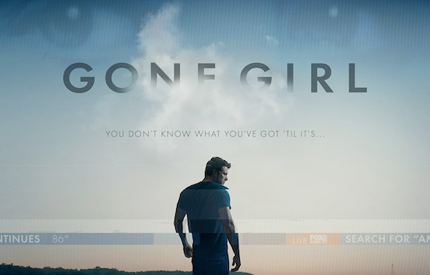Gone Girl
Date: 08/10/2014
Movie Review

Cool and calculated in the manner that he's famous for, Gone Girl is the latest thriller from the brilliant David Fincher that sees the director at his best since 2010's The Social Network.
A relatively faithful adaptation of the best-selling novel by Gillian Flynn, the film tackles worldwide recession, media bias, and the difficulty of married life head on, all wrapped up in a rather delicious, ghoulish whodunit.
At the centre of this tragic tale are Nick and Amy Dunne, two hopeless romantics whose perfect love story is thrown into disarray when they both fall victim to recession and lose their respective jobs as magazine writers. Adjusting from a wealthy New York socialite lifestyle to a mundane humdrum Mid-West existence is only the beginning of their problems however when, on their fifth anniversary, Nick comes home to discover that his wife is missing, and that there are signs of a struggle.
Structured similarly to the novel, the investigation unfolds presently, while we're treated to flashback snippets from Amazing Amy's diary, recounting how the couple met in a whirlwind of sugar, destined to be together, soul mates until the end.
However, as the almost undeniable evidence piles up against a somewhat smug, improperly behaving Nick, so too do we discover that not all was well in the Dunne household as the pressure of married life mounted, prior to Amy's disappearance. The overarching question that nobody wants to ask is – who do we believe?
Or rather, who do we want to believe?
Much of Fincher's Kafkaesque nightmare in Gone Girl is a clear satire of sensationalism that takes place in the media. Innocent until proven guilty no longer applies when cat-ish television presenters herd the public in whatever direction will get more ratings. They become judge, jury and executioner before the police have even made an arrest.
Barely a scene goes by where a television screen isn't present, giving the public the next twist in this pulpy whodunit involving America's latest sweetheart. Unfortunately for Nick, when he came home to find his front door lying open he unwilling invited the whole world along in with him. Who needs trashy holiday paperbacks anymore when the news is giving us a real life page turner that is the disappearance of Amy Dunne? What goes on behind closed doors might surprise you.
The characters of course play their parts perfectly with utter preposterousness, as this domestic melodrama unfolds. Ben Affleck is perfect in the role of Nick Dunne, boasting a villainous chin, oozing equal parts boyish charm and unnerving arrogance that we've seen him do so well before in the likes of Good Will Hunting, Dazed and Confused, and any number of Kevin Smith outings.
No stranger to being in the firing line of public opinion (remember Bennifer and Batfleck anyone?), he perfectly maintains a balance between affability and menace that keeps you guessing, until the complex, hideous truth is revealed.
Along the way he meets a number of larger-than-life characters that become embroiled in the crossfire of investigation, including a brilliantly out-of-character Neil Patrick Harris as Amy's unhinged former flame, and Tyler Perry as the charmingly sleazy Tanner Bolt, a lawyer who has made a name for himself as the “Patron Saint of Wife Killers”, kick starting the film's blackly comedic second act.
However, it is undoubtedly Rosamund Pike and her lingering eerie presence throughout that steals the show, in a role that will no doubt see her showered with award nominations galore in the New Year. Her silky narrative provides all the makings of a marriage teetering on the edge of a cliff, before falling off altogether and hitting every jagged rock on the way down.
There's a dark passenger at work in this film, one that might even give other Fincherian anti-heroes, such as Fight Club's Tyler Durden or House of Cards' Frank Underwood a run for their money. Of course, behind the scenes it's Fincher's clinically controlled directorial skills that ensure not a hair is out of place until the grim truth is finally, almost unexpectedly revealed in a manner that would make Hitchcock proud.
With widescreen shots and a dilute colour palette, you can almost feel the blood draining from each of Fincher's striking images throughout, growing paler by the minute as the case hurtles towards its grueling finale.
There are plenty of plot reversals and clichéd switchbacks throughout, all told in a “he said-she said” patter, which makes this cruel, nightmarish thriller utterly absorbing. As a blood curdling, sweat inducing, scrutinizing look at marriage, it all builds towards an unsettling, puzzling ending that sits with you for days after. That's what makes Gone Girl a sickly sweet, twisted tale that's unexpectedly witty and dangerously chilling all at the same time. And they say romance is dead.
Leigh Forgie
Listen to Leigh discuss and other movies on the banterflix.com podcast.
A relatively faithful adaptation of the best-selling novel by Gillian Flynn, the film tackles worldwide recession, media bias, and the difficulty of married life head on, all wrapped up in a rather delicious, ghoulish whodunit.
At the centre of this tragic tale are Nick and Amy Dunne, two hopeless romantics whose perfect love story is thrown into disarray when they both fall victim to recession and lose their respective jobs as magazine writers. Adjusting from a wealthy New York socialite lifestyle to a mundane humdrum Mid-West existence is only the beginning of their problems however when, on their fifth anniversary, Nick comes home to discover that his wife is missing, and that there are signs of a struggle.
Structured similarly to the novel, the investigation unfolds presently, while we're treated to flashback snippets from Amazing Amy's diary, recounting how the couple met in a whirlwind of sugar, destined to be together, soul mates until the end.
However, as the almost undeniable evidence piles up against a somewhat smug, improperly behaving Nick, so too do we discover that not all was well in the Dunne household as the pressure of married life mounted, prior to Amy's disappearance. The overarching question that nobody wants to ask is – who do we believe?
Or rather, who do we want to believe?
Much of Fincher's Kafkaesque nightmare in Gone Girl is a clear satire of sensationalism that takes place in the media. Innocent until proven guilty no longer applies when cat-ish television presenters herd the public in whatever direction will get more ratings. They become judge, jury and executioner before the police have even made an arrest.
Barely a scene goes by where a television screen isn't present, giving the public the next twist in this pulpy whodunit involving America's latest sweetheart. Unfortunately for Nick, when he came home to find his front door lying open he unwilling invited the whole world along in with him. Who needs trashy holiday paperbacks anymore when the news is giving us a real life page turner that is the disappearance of Amy Dunne? What goes on behind closed doors might surprise you.
The characters of course play their parts perfectly with utter preposterousness, as this domestic melodrama unfolds. Ben Affleck is perfect in the role of Nick Dunne, boasting a villainous chin, oozing equal parts boyish charm and unnerving arrogance that we've seen him do so well before in the likes of Good Will Hunting, Dazed and Confused, and any number of Kevin Smith outings.
No stranger to being in the firing line of public opinion (remember Bennifer and Batfleck anyone?), he perfectly maintains a balance between affability and menace that keeps you guessing, until the complex, hideous truth is revealed.
Along the way he meets a number of larger-than-life characters that become embroiled in the crossfire of investigation, including a brilliantly out-of-character Neil Patrick Harris as Amy's unhinged former flame, and Tyler Perry as the charmingly sleazy Tanner Bolt, a lawyer who has made a name for himself as the “Patron Saint of Wife Killers”, kick starting the film's blackly comedic second act.
However, it is undoubtedly Rosamund Pike and her lingering eerie presence throughout that steals the show, in a role that will no doubt see her showered with award nominations galore in the New Year. Her silky narrative provides all the makings of a marriage teetering on the edge of a cliff, before falling off altogether and hitting every jagged rock on the way down.
There's a dark passenger at work in this film, one that might even give other Fincherian anti-heroes, such as Fight Club's Tyler Durden or House of Cards' Frank Underwood a run for their money. Of course, behind the scenes it's Fincher's clinically controlled directorial skills that ensure not a hair is out of place until the grim truth is finally, almost unexpectedly revealed in a manner that would make Hitchcock proud.
With widescreen shots and a dilute colour palette, you can almost feel the blood draining from each of Fincher's striking images throughout, growing paler by the minute as the case hurtles towards its grueling finale.
There are plenty of plot reversals and clichéd switchbacks throughout, all told in a “he said-she said” patter, which makes this cruel, nightmarish thriller utterly absorbing. As a blood curdling, sweat inducing, scrutinizing look at marriage, it all builds towards an unsettling, puzzling ending that sits with you for days after. That's what makes Gone Girl a sickly sweet, twisted tale that's unexpectedly witty and dangerously chilling all at the same time. And they say romance is dead.
Leigh Forgie
Listen to Leigh discuss and other movies on the banterflix.com podcast.





































